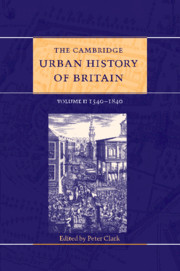Book contents
- Frontmatter
- 1 Introduction
- Part I Area surveys 1540–1840
- Part II Urban themes and types 1540–1700
- Part III Urban themes and types 1700–1840
- 14 Urban growth and economic change: from the late seventeenth century to 1841
- 15 Population and society 1700–1840
- 16 Politics and government 1700–1840
- 17 Culture and leisure 1700–1840
- 18 The transformation of urban space 1700–1840
- 19 London 1700–1840
- 20 Regional and county centres 1700–1840
- 21 Ports 1700–1840
- 22 Small towns 1700–1840
- 23 Health and leisure resorts 1700–1840
- 24 Industrialising towns 1700–1840
- 25 Conclusion
- Select Bibliography
- Index
- References
22 - Small towns 1700–1840
from Part III - Urban themes and types 1700–1840
Published online by Cambridge University Press: 28 March 2008
- Frontmatter
- 1 Introduction
- Part I Area surveys 1540–1840
- Part II Urban themes and types 1540–1700
- Part III Urban themes and types 1700–1840
- 14 Urban growth and economic change: from the late seventeenth century to 1841
- 15 Population and society 1700–1840
- 16 Politics and government 1700–1840
- 17 Culture and leisure 1700–1840
- 18 The transformation of urban space 1700–1840
- 19 London 1700–1840
- 20 Regional and county centres 1700–1840
- 21 Ports 1700–1840
- 22 Small towns 1700–1840
- 23 Health and leisure resorts 1700–1840
- 24 Industrialising towns 1700–1840
- 25 Conclusion
- Select Bibliography
- Index
- References
Summary
britain’s myriad of small towns remained at the heart of economic and social life into the early Victorian era, bridging the urban and rural worlds. Diaries like that of the Sussex shopkeeper Thomas Turner of East Hoathly reveal an almost constant interaction between villagers and small towns. Turner records how he went to the nearby town of Lewes to buy cottons and cheese, to attend property sales, pay debts, get a doctor, scotch rumours about the disharmony between him and his wife, to participate in church events, to ‘see the finest horse-race that ever I see run’ and as often as not to get drunk and come rolling home. While the traditional open market, the nucleus of most small towns since their inception, was often in decline after 1700, these communities consolidated their position in Georgian provincial society, growing in population and prosperity, as they acquired retail shops and specialist crafts, as well as new leisure activities. The transformation did not occur overnight. In the 1720s the antiquarian and polymath William Stukeley, fresh from London, was dismayed at the small town of Stamford in Lincolnshire, where there was ‘not one person … that had any taste or love of learning’ but within a few years things began to improve, as music making and club life blossomed, and he concluded eventually that this ‘is true life, not the stink and noise and nonsense of London’. By the 1760s Fanny Burney could talk of the ‘perpetual round of constrained civilities … unavoidable in a country town’.
- Type
- Chapter
- Information
- The Cambridge Urban History of Britain , pp. 733 - 774Publisher: Cambridge University PressPrint publication year: 2000
References
- 25
- Cited by



